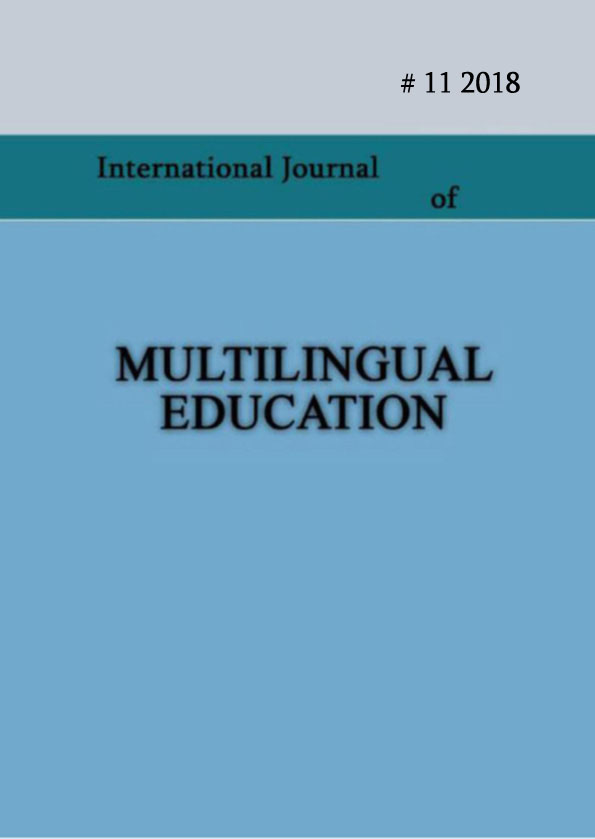Linguistic and Communicative Competence: Coping with the Typical Errors of Georgian Learners of English
Abstract
This paper attempts to provide certain advice for Georgian teachers of English who aim to develop both the linguistic and communicative competences of their students. Hence, the paper focuses on the challenges related to the development of linguistic competence, embracing vocabulary and grammar issues. In this regard, typical errors of Georgian learners of English are analysed. Hints are provided as to what issues should be addressed with the aim of avoiding native language interference. The theoretical basis for the given research embraces scientific works by R. Lado, C. Fries, C. Prator, G. Leech and other scholars. The use of the contrastive method has enabled the author to identify the basic semantic and structural differences between the native and the target languages (in this case, Georgian and English). The empirical material has been collected and analysed during twenty years of teaching experience at the English Department of Tbilisi State University.
It is widely known that, apart from linguistic competence, the aim of every teacher is to develop the students’ communicative competence. The latter embraces social knowledge about how and when to use utterances appropriately. Therefore, this paper also dwells on politeness rules and norms of speech etiquette as certain utterances that are quite acceptable for Georgian culture, in interactions with foreigners may turn into face-threatening acts. Thus, based on the author’s previous research (a monograph and numerous papers published in various linguistic journals), the paper provides certain hints on how to equip Georgian students with the knowledge of politeness rules, appropriate forms of address, tabooed words and expressions, proper understanding of the illocutionary force of indirect speech-acts, phatic communication and other culture-related language factors.
A focus on the errors frequently made by Georgian learners of English has proved the necessity for the publication and use of textbooks compiled by Georgian authors. Such manuals should contain special notes and exercises with the emphasis on the structural and pragmatic aspects related to typical errors of Georgian learners of English.
The findings of the given research might be of interest for Georgian teachers of English who aim to provide their students with the necessary linguistic and communicative skills in the target language.
References
Brown, Levinson, 1996 - Brown, P. & Levinson, S. (1996). Politeness. Some Universals in Language Usage. Cambridge University Press.
Corder, 1981 - Corder, S.P. (1981). Error Analysis and Interlanguage. Oxford University Press. London. Fries, 1983 - Fries, C. (1983). Linguistics and Reading. Irvington Publishers. New York.
Gass, 1979 - Gass, S. (1979) Language Transfer and Universal Grammatical Relations, in Language Learning, Volume 29, No. 2. pp. 327 - 344.
Goksadze, 1996 - Goksadze, L., Demetradze, I. (1996). British-Georgian Culture Differences. Politeness Norms. Tbilisi Independent University Publishing-House “Nekeri”.
Hymes, 1972 - Hymes, Dell. “On Communicative Competence". In Pride, J.B. 1972;
Holmes, 1972 - Holmes, J. “Sociolinguistics: Selected Readings“. Harmondsworth: Penguin. 1972. pp. 269 - 293.
Lado, 1957 - Lado, R. (1957). Linguistics Across Cultures. University of Michigan Press. Leech, 1983 - Leech, G. (1983). Principles of Pragmatics. London, New York: Longman. Miall, 1993 - Miall, A. (1993) The Xenophobe’s Guide to the English. Ravette Books.
Prator, 1979 - Prator, C. H., & Celce-Murcia, M. (1979). An Outline of Language Teaching Approaches. Teaching English as a Second or Foreign Language.Celce-Murcia and McIntosh. Rowley, MA: Newbury House.
Published
How to Cite
Issue
Section
License
Copyright (c) 2018 Irina Demetradze

This work is licensed under a Creative Commons Attribution-NonCommercial 4.0 International License.
Copyright (c) - Authors who publish with this journal agree to the following terms: Authors retain copyright and grant the journal the right of first publication with the work simultaneously licensed under a Creative Commons Attribution-Noncommercial 4.0 International License, which allows others to share the work with an acknowledgement of the work's authorship and initial publication in this journal. Authors are permitted and encouraged to post their work online (e.g., in institutional repositories or on their personal website) prior to and during the submission process, as it can lead to productive exchanges, as well as earlier and greater citation of published work (see The Effect of Open Access). Authors may enter into separate, additional contractual arrangements for the non-exclusive distribution of the journal's published version of the work (e.g., post it to a repository or publish it in a book), with an acknowledgement of its initial publication in this journal.

